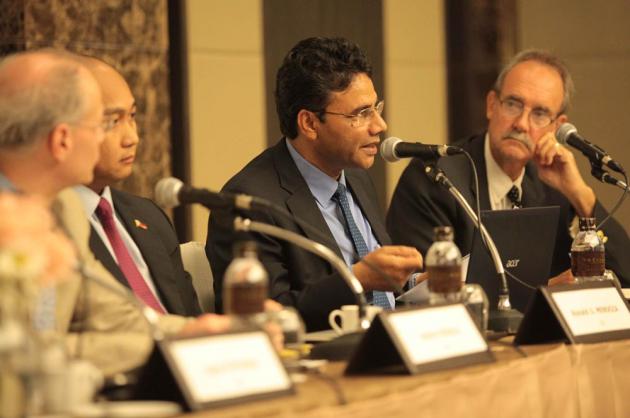Consumer-led growth crucial for stability: experts say

Asia told to address income inequality, resource distribution imbalance
To reach economic stability, emerging markets in Asia, including Thailand, need to concentrate on consumer-led growth by increasing domestic demand and investment while fixing income inequality and the imbalance in resource distribution, according to academics and economists.
“The government should encourage domestic demand and private investment by increasing consumers’ purchasing power through the restructuring of its tax system and policies,” Suthiphand Chirathivat, chairman of the Chula Global Network, said yesterday.
“Productive investment by the government in terms of education and social infrastructure is also needed to promote the country’s competitiveness and development through consumer-led growth,” he told a forum hosted by the German Konrad Adenauer Foundation in cooperation with Chulalongkorn University.
Increased government involvement in the market and a good basic finance structure are needed to achieve economic stability in Thailand and the country’s development should concentrate on “inclusive growth”.
“Inclusive growth is also important for sustainable development, since there are challenges that cannot be solved solely by an increase in productivity. Inclusive growth means that everyone in society should be able to benefit from the country’s growth, and fixing unequal distribution of resources and income inequality is the key to achieving it,” he said.
Kanit Sangsubhan, director of the Fiscal Policy Research Institute Foundation, believes increased government spending, greater cooperation with neighbouring countries and a stable political climate are needed for economic stability in Thailand.
“Our investment level is very low. The government needs to invest in large-scale infrastructure projects, especially those that will improve our connectivity with neighbouring countries,” he said.
“Thailand depends on our neighbours for resources such as natural gas from Myanmar and unskilled labour from Cambodia. That is why it is imperative to improve our connections with them. Beside interconnectivity through infrastructure projects, the government should also encourage Thais to invest in foreign countries through tax incentives in order to prepare for the Asean Economic Community,” he said.
Political stability is of utmost importance. Political turmoil in the past impaired Thailand’s ability to achieve full economic growth because it was unable to invest in long-term projects, which are needed to achieve economic stability.
Rolf Langhammer, past vice president of the Kiel Institute for the World Economy in Germany, said emerging markets in Asia needed good statesmen and direct taxation in order to achieve economic stability.
“Governments in Asia need credibility. They have to prove to their citizens that when they pay taxes they will get something in return and that [the money] has been put to good use, such as investment to improve the education system and infrastructure projects,” he said.
“They have to be transparent in their policies by explaining to their citizens clearly about their targets for the future,” he said.
Fairness in resource distribution and income equality are important to improve the government’s credibility. If people can see that they are being treated equally through fairness in distribution, governments in emerging countries will gain credibility and there will be less chance of political instability, Langhammer said.
Martin Schulz, a senior economist at Japan’s Fujitsu Research Institute, said the structural slowdown in the Western economies was partially caused by an ageing demography that will not go away, and Asia needed to prepare for a similar problem in the next 10 years.
Since growth in the Western economies will not come back, the old export-driven model is not working any more for Asia, which has to move towards domestic-driven economies, partly through developing their service sectors.
The second issue is the decline in imports from China, which means the rest of the Asian economies need to look to more trade among themselves, Schulz said.
One challenge facing Asian economies as they transition to the new economic-development model is to open up their service sector, including information-technology and retail industries, which are monopolised. Asian countries also need to invest in IT infrastructure.
The anti-government demonstrators in Bangkok are not satisfied with the development model that the country has used so far, and this reflects the need for more reforms in the country, he said.
Ronald Mendoza, executive director of the Asian Institute of Management’s policy centre in the Philippines, said the way to go was to push for sustainable and high enough growth in the new economic landscape where Asia will rely less on the United States and China. Achieving quality and “inclusive” growth is much preferable to double-digit growth in gross domestic product.
The Philippines also needs to diversify its economy and address inequality, he said.
Rajat Kathuria, director and chief executive of the Indian Council for Research on International Economic Relations, said “proximity to power” drove economic growth in India, not innovation. However, market-led growth will not come as a free meal. The country needs to design a new institutional system and have credible “machinery” in place.
RELATED





